There are two main types of bicycle forks that are made from either carbon or aluminum. Both materials have their own advantages and disadvantages. It really depends on the type of bike you have and what you will be using it for as to which material is better. Here is a comparison of carbon and aluminum forks to help you decide which is better for your bike.
Which Is Better Overall Carbon Forks or Aluminum Forks
There are pros and cons to each type of fork, and it really depends on what type of bike you have and what you will be using it for as to which is the better option. There is a lot of debate in the biking community about which type of fork is better, carbon or aluminum. Here, we will take a look at both types of forks and help you decide which is better for your bike.
Strength of carbon forks compared to aluminum forks
Both have their own advantages and disadvantages, so it really depends on what you’re looking for in a fork as to which one is better overall. There are two main types of forks that are used on bicycles – carbon forks and aluminum forks.
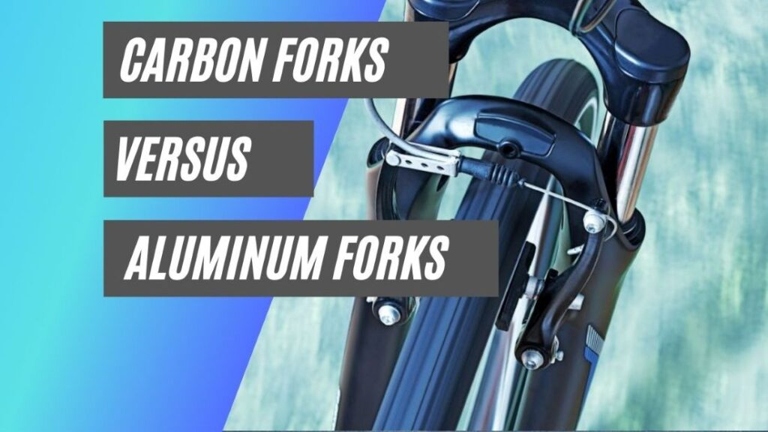
Carbon forks are often seen as being the better choice because they’re lighter weight and more durable than aluminum forks. However, they can be more expensive and may not be as strong as aluminum forks in some cases.
They’re not as durable as carbon forks, but they can be just as strong. Aluminum forks are usually cheaper than carbon forks, but they’re also heavier.
It really depends on your needs and what you’re looking for in a fork. If you’re looking for a cheaper option that’s still strong, then aluminum is the better choice. If you need a lightweight and durable fork, then carbon is the way to go. So, which is better overall?
Handling/responsiveness of a carbon frame vs aluminum frame
There are a lot of different factors to consider when deciding whether to get a carbon frame or an aluminum frame for your bike. One of the most important factors is the handling and responsiveness of the frame.
This is because carbon is a stiffer material than aluminum, so it doesn’t flex as much when you’re riding. This means that the bike will feel more responsive to your inputs, and you’ll be able to take corners more quickly. Carbon frames are generally more responsive and have better handling than aluminum frames.
However, they’re not as good at handling and responsiveness as carbon frames. Aluminum frames are less expensive than carbon frames, so they’re a good option if you’re on a budget.
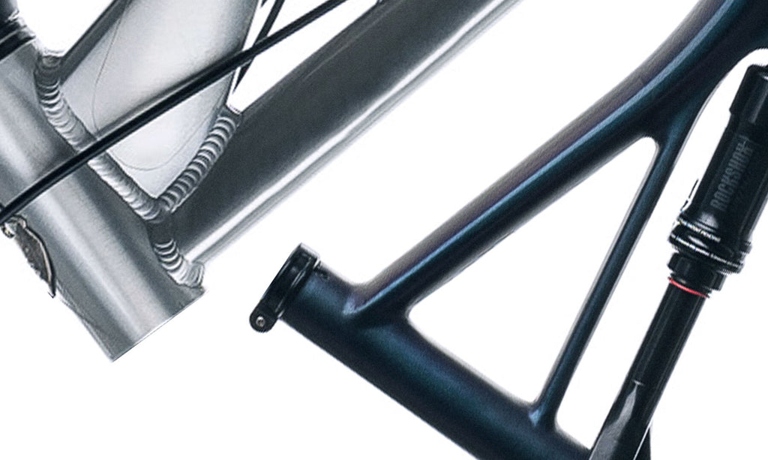
However, if you’re on a budget, then an aluminum frame is a good option. If you’re looking for the best possible handling and responsiveness, then a carbon frame is the way to go.
Performance of a carbon frame vs an aluminum frame
One is the weight of the bike. Finally, you’ll want to consider the price of the frame. There are a few key factors to consider when comparing the performance of a carbon frame vs an aluminum frame. Carbon frames are typically more expensive than aluminum frames, but they can also last longer and offer a smoother ride. A carbon frame is typically going to be lighter than an aluminum frame, which can make a difference when climbing hills or accelerating. A carbon frame is typically going to be stiffer than an aluminum frame, which can make a difference when riding on rough roads or when sprinting. Another factor to consider is the stiffness of the frame.
Comfort of a carbon frame compared to an aluminum frame
A carbon frame is often seen as a more comfortable option compared to an aluminum frame. Additionally, carbon frames are often lighter than aluminum frames, which can also contribute to a more comfortable ride. This is because carbon is able to absorb vibrations better than aluminum, making for a smoother ride.

Some riders may prefer the feel of an aluminum frame, and there are also other factors that can affect comfort levels (such as tire pressure and saddle height). Ultimately, it is important to test out both options to see which one works best for you. However, it is important to keep in mind that comfort is subjective.
Price comparison between a carbon frame and an aluminum frame
When it comes to choosing a frame for your bike, there are a few different materials to choose from. So, which is better overall carbon forks or aluminum forks? Two of the most popular options are carbon and aluminum.
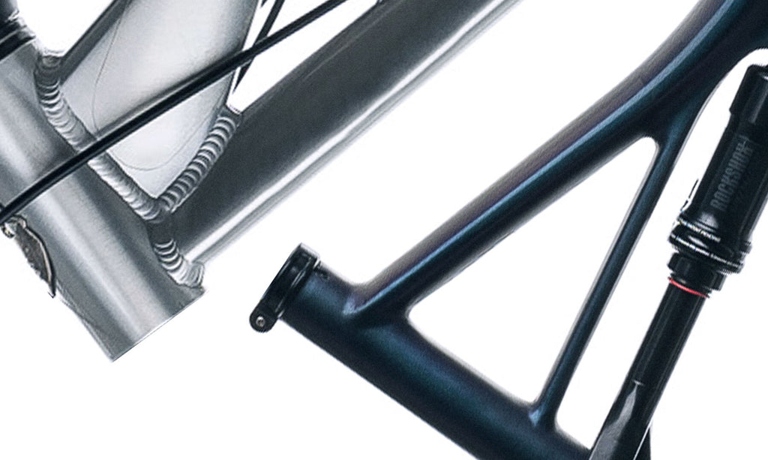
One is the price. However, it is important to keep in mind that a carbon frame is also going to be lighter and stronger than an aluminum frame. A carbon frame is going to be more expensive than an aluminum frame. There are a few things to consider when making this decision.
Another thing to consider is the type of bike you will be using. This is because a carbon frame is going to be more aerodynamic than an aluminum frame. If you are going to be using your bike for racing, then a carbon frame is going to be the better option.
This is because an aluminum frame is going to be more comfortable to ride on. However, if you are just going to be using your bike for leisurely rides, then an aluminum frame is going to be the better option.
It really depends on what you are going to be using your bike for. However, if you are looking for a frame that is more comfortable to ride on, then an aluminum frame is the way to go. So, which is better overall carbon forks or aluminum forks? If you are looking for a frame that is light and strong, then a carbon frame is the way to go.
Type of bike and what features of carbon are needed
There are two main types of bike forks – carbon and aluminum. Here is a breakdown of each type of fork and what features of carbon are needed to make it the best choice for your bike. Both have their own set of pros and cons that make them better or worse for different types of bikes.
This makes them ideal for road bikes and cross-country mountain bikes, where weight is a major consideration. Carbon forks are generally lighter than aluminum forks. Carbon forks are also more expensive than aluminum forks.
This is because carbon absorbs vibrations better than aluminum. Carbon forks have a smoother ride than aluminum forks. This makes carbon forks ideal for road bikes, which are ridden on smooth pavement.
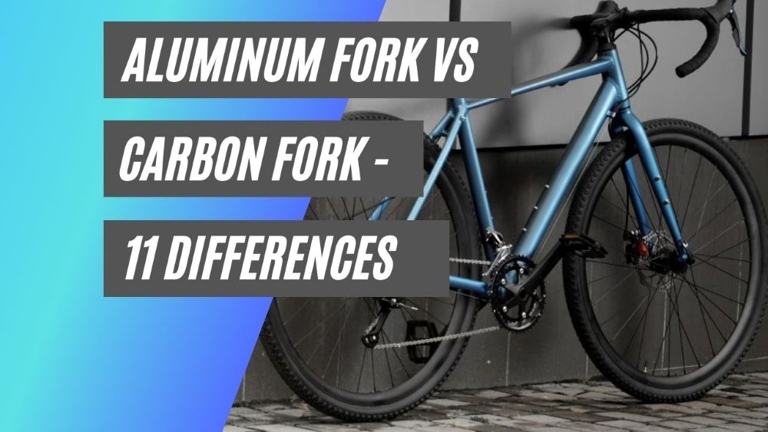
This makes them better for downhill mountain biking, where you need the fork to be stiff in order to handle the rough terrain. Carbon forks are also more rigid than aluminum forks.
Lugged forks are made from multiple pieces of carbon that are joined together. This makes them lighter and more expensive than lugged forks. Monocoque forks are made from a single piece of carbon. There are two main types of carbon forks – monocoque and lugged. This makes them stronger than monocoque forks, but also heavier.
For road bikes, you want a lightweight fork that will absorb vibrations. When choosing a carbon fork, you need to consider the type of bike you will be using it on. For downhill mountain bikes, you want a stiff fork that can handle the rough terrain.
Road bike – reasons to get carbon forks or not
There are a few key reasons to get carbon forks for your road bike. One is that they are much lighter than aluminum forks, which can make a big difference if you are racing or trying to ride fast. Another reason is that they absorb vibrations better, which can make for a more comfortable ride. Finally, carbon forks tend to be stiffer than aluminum forks, which can improve handling.
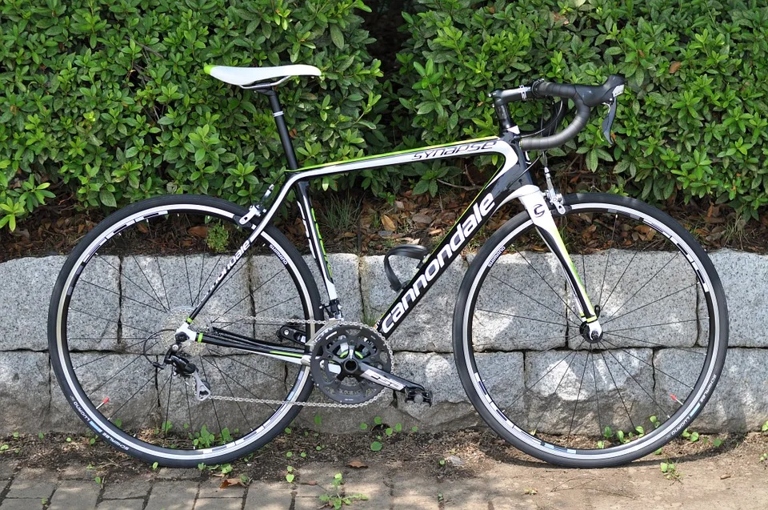
Finally, some people simply prefer the feel of aluminum forks. However, there are also a few reasons to not get carbon forks. One is that they are more expensive than aluminum forks. Another is that they can be more difficult to repair if they break.
If you are looking for a more affordable option that is still comfortable and efficient, then aluminum may be a better choice. So, which is better overall carbon forks or aluminum forks? It really depends on your budget, your riding style, and your preferences. If you are looking for the lightest and stiffest option, then carbon is the way to go.
Mountain bike – reasons to get carbon forks or not
First, they are incredibly lightweight, which can make a big difference when you are trying to get up and over obstacles. Second, they are very strong and stiff, meaning that they will hold up to a lot of abuse. Third, they absorb vibrations very well, making for a smoother ride. Finally, they look great and can really make your bike stand out from the crowd. There are a few key reasons to get carbon forks for your mountain bike.
Finally, they are easier to repair if they do get damaged. Third, they are not as susceptible to damage from rocks and other obstacles. Second, they are typically just as strong and stiff as carbon forks. First, they are much less expensive than carbon forks. Aluminum forks have a few advantages as well.

However, if you are on a budget or if you are looking for something that is easier to repair, then aluminum is the better choice. If you want the lightest, strongest, and best-looking forks, then carbon is the way to go. It really depends on what you are looking for and what you are willing to spend. So, which is better overall?
BMX – reasons to get carbon forks or not
They are as follows: There are a few reasons to get carbon forks or not.
1. Carbon forks are lighter than aluminum forks.

2. Carbon forks can be more comfortable to ride on because they absorb vibrations better.
3. Carbon forks can be more expensive than aluminum forks.
4. Carbon forks can be less durable than aluminum forks.
5. Carbon forks can be more difficult to repair than aluminum forks.
Utility/City – reasons to get carbon forks or not
They are as follows: There are a few reasons to get carbon forks or not.
1. Carbon forks are usually lighter than aluminum forks.
2. Carbon forks can absorb more vibrations than aluminum forks.
3. Carbon forks can be more expensive than aluminum forks.
4. Carbon forks may not be as strong as aluminum forks in some cases.
5. Carbon forks may not be compatible with some frame designs.
6. Aluminum forks may be more durable than carbon forks in some cases.
7. Aluminum forks may be less expensive than carbon forks.
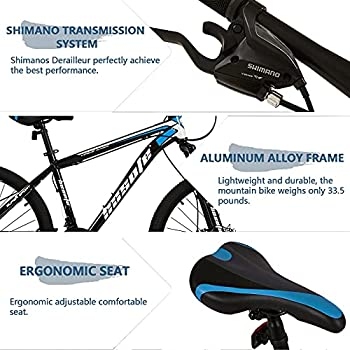
8. Aluminum forks may be more compatible with some frame designs.
Track bike – reasons to get carbon forks or not
First, let’s look at the benefits of carbon forks. Carbon forks are much lighter than aluminum forks, which can make a big difference when riding a track bike. There are a few reasons to get carbon forks or not. They are also much stiffer, which can improve handling. Carbon forks also tend to absorb vibrations better than aluminum forks, which can make for a smoother ride.
Now, let’s look at the drawbacks of carbon forks. Additionally, some riders find that carbon forks can feel “harsh” when riding over bumpy terrain. They can be more expensive than aluminum forks, and they can be more difficult to repair if they break.

However, if you’re looking for a fork that’s more affordable and easier to repair, then aluminum is the way to go. If you’re looking for a light and stiff fork that will improve handling, then carbon is the way to go. So, which is better overall- carbon forks or aluminum forks? It really depends on your personal preferences and riding style.
Cruiser – reasons to get carbon forks or not
Another reason is that carbon is more forgiving than aluminum, so if you’re riding on rough roads or trails, carbon will help absorb some of the vibrations and bumps. One is that carbon is lighter than aluminum, so if you’re looking to save weight on your bike, carbon is the way to go. There are a few reasons to get carbon forks over aluminum. Finally, carbon can be molded into different shapes, so you can get carbon forks that are specifically designed for your bike and riding style.
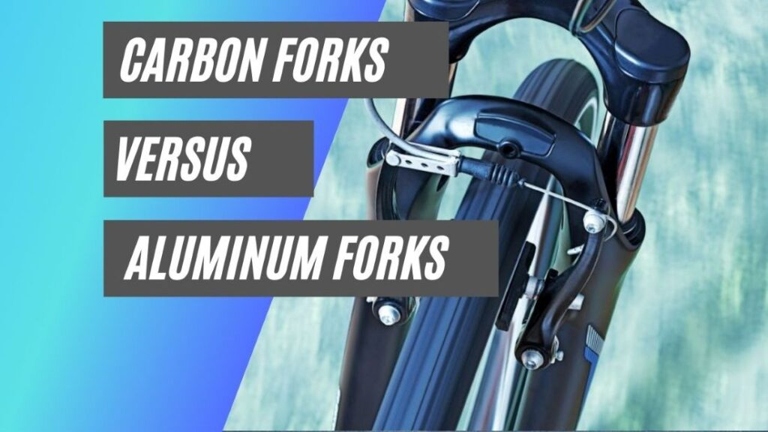
Another reason is that aluminum is more durable than carbon, so if you’re planning on doing a lot of off-road riding, aluminum is a good choice. Finally, aluminum is easier to repair than carbon, so if you’re worried about breaking your forks, aluminum is a good option. One is that aluminum is less expensive than carbon, so if you’re on a budget, aluminum is a good option. However, there are also a few reasons to choose aluminum over carbon.
Electric bike – reasons to get carbon forks or not
There are a few reasons to get carbon forks or not. Finally, carbon is more expensive than aluminum. Another reason is that carbon is more durable than aluminum. This means that you will have to pay more for a carbon fork, but it will be worth it in the long run. One reason is that carbon is lighter than aluminum. This means that it will last longer and not break as easily. This means that it will be easier to ride your bike up hills.
Sources
There are a few key factors to consider when deciding if a carbon or aluminum fork is better for your bike. A carbon fork will generally be lighter than an aluminum fork, making it a good choice for a road bike where weight is a key factor. However, an aluminum fork may be a better choice for a mountain bike, where strength and durability are more important than weight. The first is the weight of the bike.
The second factor to consider is the price. Carbon forks are generally more expensive than aluminum forks, so if you’re on a budget, an aluminum fork may be the better choice.
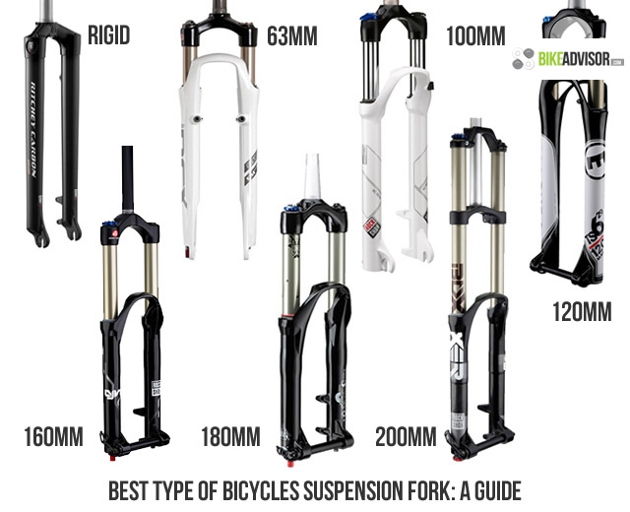
The third factor to consider is the ride quality. A carbon fork will generally provide a smoother ride than an aluminum fork, making it a good choice for a road bike. However, an aluminum fork may be a better choice for a mountain bike, where a smoother ride is not as important as strength and durability.
It depends on your bike and your riding goals. If you’re looking for a light weight road bike, a carbon fork may be the better choice. And if you’re on a budget, an aluminum fork may be the better choice. So, which is better? If you’re looking for a durable mountain bike, an aluminum fork may be the better choice.
Frequently Asked Questions
1. What are the main differences between carbon and aluminum forks?
Carbon forks are typically lighter and more expensive than aluminum forks. They also tend to offer better vibration damping, which can improve ride quality.
2. Which type of fork is better for road bikes?
Carbon forks are generally better for road bikes, as they offer a smoother ride and better vibration damping. However, they are more expensive than aluminum forks.
3. Which type of fork is better for mountain bikes?
There is no clear consensus on which type of fork is better for mountain bikes. Some people prefer carbon forks for their lighter weight and improved ride quality, while others prefer aluminum forks for their durability and lower cost.
4. Are there any disadvantages to carbon forks?
The main disadvantage of carbon forks is their high cost. They are also more susceptible to damage from impact than aluminum forks.
5. Are there any disadvantages to aluminum forks?
The main disadvantage of aluminum forks is that they are not as light as carbon forks. They also tend to be less comfortable, as they don’t dampen vibrations as well.
Final thoughts
There are many factors to consider when choosing between a carbon fork and an aluminum fork for your bike. If you are looking for a lightweight option, carbon is the way to go. If you are looking for a fork that is less expensive, aluminum is the way to go. Ultimately, the decision comes down to what you are looking for in a fork and what your budget is.
